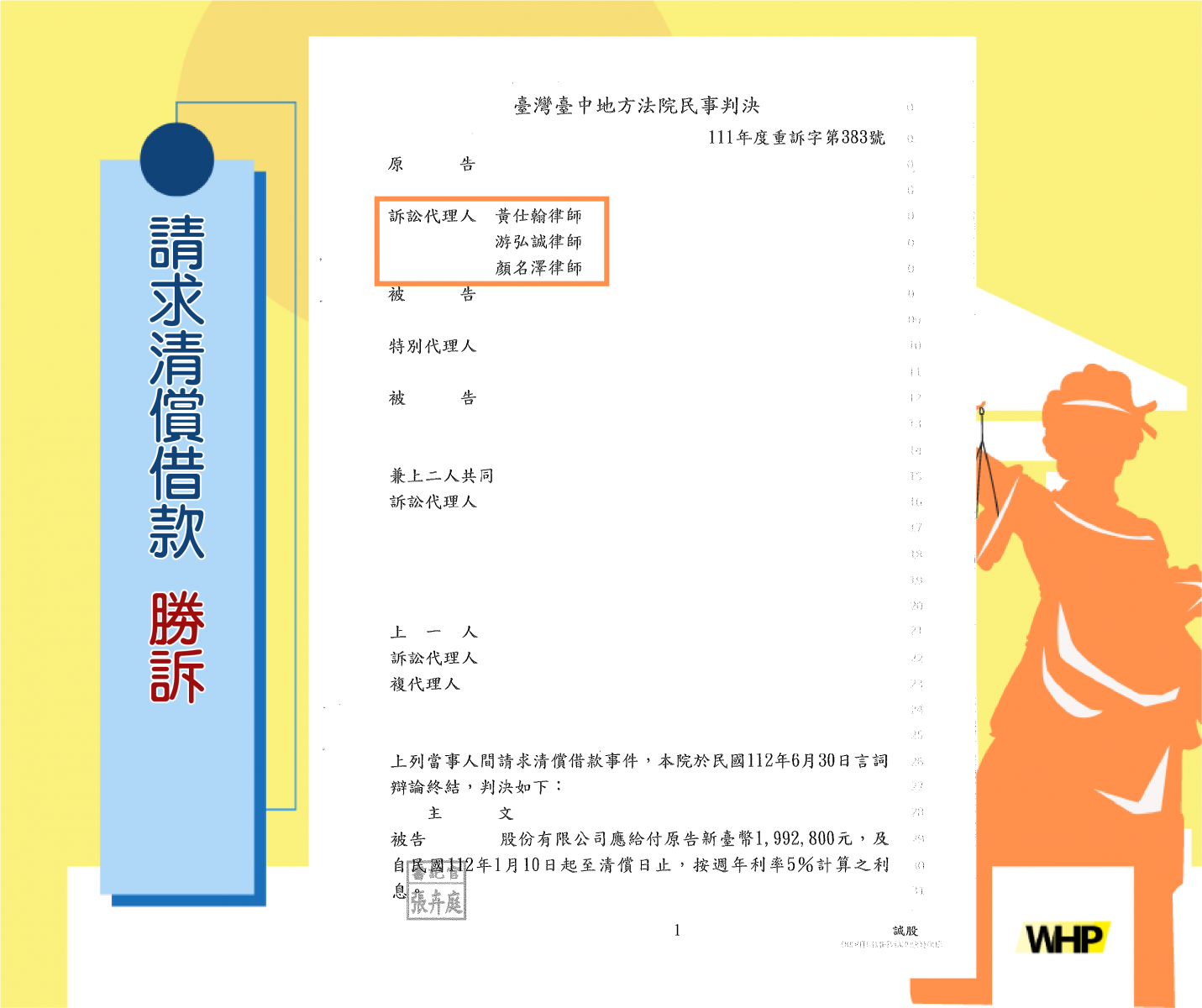首頁 > Case Studies
Case Studies | Civil Case | Check Dishonored – Claim for Loan Repayment – Plaintiff Prevails

Relevant Legal Provisions
Article 133 of the Negotiable Instruments Act:When the holder exercises the right of recourse against the debtor of a check, they may claim interest from the date of presentment for payment; if no interest rate has been agreed upon, it shall be calculated at an annual rate of six percent.
Facts and Reasons
The plaintiff's uncle passed away many years ago. The uncle's family, citing the uncle's debts during his lifetime and the need for funds to meet financial turnover, jointly and continuously borrowed money from the plaintiff, with the total loan amount reaching several million New Taiwan Dollars. Although the family members provided seven checks issued by a company they were responsible for as collateral, when the plaintiff presented these checks, they were dishonored due to insufficient funds. The plaintiff believed that the family members, having borrowed jointly, should bear joint and several liability for repayment, and that the company should also bear the obligation of payment under the negotiable instruments. The plaintiff later filed a criminal complaint for fraud against the defendants. The investigation by the prosecutorial authority confirmed that there was indeed a consumption loan relationship between the plaintiff and the defendants, that the defendants had indeed received the plaintiff's payments, that there was an agreement on interest, and that checks were delivered as collateral at the time of the loan. Accordingly, the plaintiff filed this lawsuit based on the consumption loan relationship and the negotiable instrument relationship.
Judgment
According to Article 133 of the Negotiable Instruments Act, when the holder exercises the right of recourse against the debtor of a check, they may claim interest from the date of presentment for payment; if no interest rate has been agreed upon, it shall be calculated at an annual rate of six percent. The plaintiff, as the holder of the three checks in this case, is entitled to exercise rights under the checks, and the defendants should be liable in accordance with the terms stated on the checks.
In the matter of the claim for loan repayment between the parties, the defendants are ordered to pay the relevant compensation amount until the date of full repayment, with interest calculated at an annual rate of 5%.
(Note: To protect the client's interests, certain case details and judgment images have been redacted and modified. For a full review of the case, please refer to Judicial Yuan's judgment database)
Attorneys:Vincent Huang、Kevin Yu、Ian Yan
-
11.25 2025Case Studies
Criminal | Forgery of Documents, etc. Successfully...
-
11.18 2025Case Studies
Civil Case | Defendant’s Claim for Damages Success...
-
11.11 2025Case Studies
Criminal | Violation of Anti-Money Laundering Act,...
-
10.28 2025Case Studies
Criminal Case | Defendant Acquitted of Hit-and-Run...
-
10.21 2025Case Studies
Criminal Case | Defendant Charged with Forgery Acq...
-
10.14 2025Case Studies
Assisted in the Division of Co-owned Property and ...
-
09.30 2025Case Studies
Defendant – Offenses Against Sexual Autonomy Appea...
-
09.23 2025Case Studies
Criminal | Defendant Charged with Embezzlement in ...
-
09.16 2025Case Studies
Criminal | Case of Infringement of Sexual Privacy ...
-
09.09 2025Case Studies
Request for Ownership Transfer Registration – Plai...
-
09.02 2025Case Studies
Civil | Joint Construction Dispute Requesting Perf...
-
08.26 2025Case Studies
Criminal | Defendant Charged with Aggravated Fraud...
-
08.19 2025Case Studies
Internal Company Dispute Defendant Forged Document...
-
08.12 2025Case Studies
Civil Case | Check Dishonored – Claim for Loan Rep...
-
08.05 2025Case Studies
Heavy Motorcycle Rear-End Collision, Lawsuit for N...